Tadej Pogacar: I don't think I'm the best rider out there, I just try to do my best
Interview: Double Tour de France champion talks attacking, suspicions, and staying cool
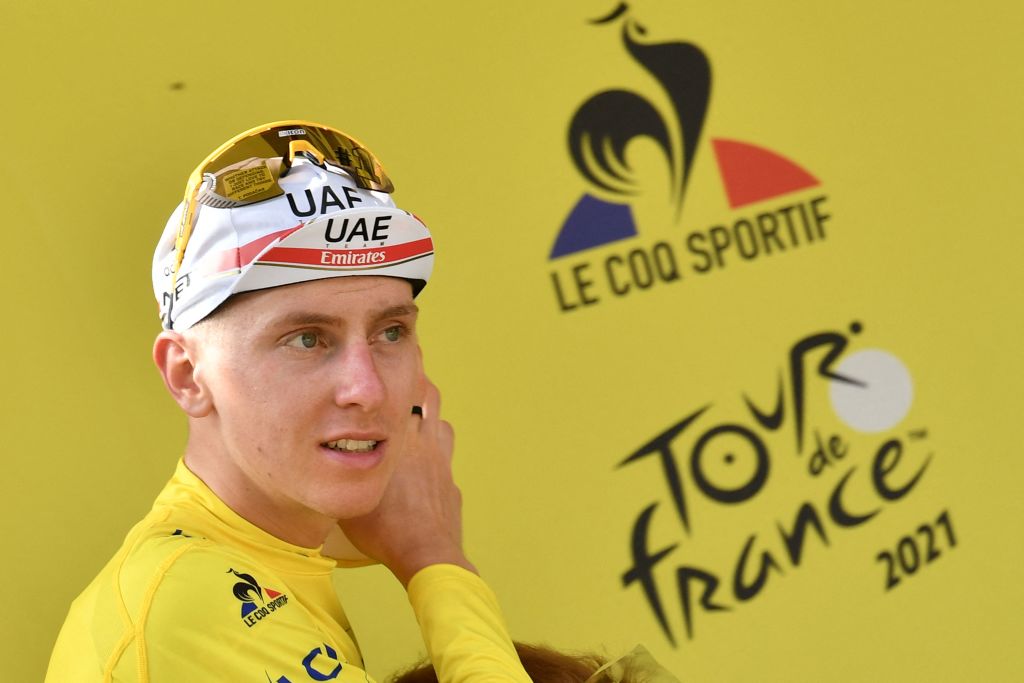
Professional cycling, especially the Tour de France, can seem incredibly difficult, stressful and almost overpowering. Yet Tadej Pogačar makes winning the biggest races, especially the Tour de France, look so natural.
The 23-year-old Slovenian races with enthusiasm, seemingly enjoying the suffering while attacking alone in the Alps or more recently on the decisive climb of Il Lombardia. He is making history but shrugs off the weight of expectation in the same way he instinctively dispatches his rivals.
Yet Pogačar is no Cannibal and doesn’t really want to be the next Eddy Merckx, even if the Belgian great recently crowned him as his heir.
Pogačar is courteous and softly spoken, his boyish looks and innocence justifying his first Slovenian nickname of 'Tamau’ because of his scrawny build and fair skin. He doesn’t have the anger and aggression of Lance Armstrong, the melancholia of Marco Pantani or the devouring ambition of Bernard Hinault or Eddy Merckx. He is not driven by revenge or to defeat his rivals.
There is certainly no ego when he talks to Cyclingnews in an exclusive interview.
He impresses everyone, including his competitors and fellow Tour de France winners like Chris Froome, with his enthusiasm, air of youthful innocence and love for a cycling life.
"Tadej seems to be natural at winning the biggest races," Froome recently told Cyclingnews in admiration.
Get The Leadout Newsletter
The latest race content, interviews, features, reviews and expert buying guides, direct to your inbox!
"It took me years to learn to deal with all the pressure, the expectancy and the scrutiny - in the race and outside it. He seems to deal with it all, both mentally and physically, with ease. He’s clearly at ease with himself and what he’s doing. I’m very impressed."
Pogačar acknowledges the significance of his success in 2021 but struggles to contextualise that he is making cycling history.
"I don’t think I’m the best rider out there, I just try to do my best, be the best I can," he tells Cyclingnews.
"2021 was my best-ever season but that doesn’t mean I’m better than everyone else
"It’s not always easy but I try to not overthink things and focus on myself. There’s always some pressure on me but I manage to convert pressure into something positive. I put pressure on myself but I think that’s good; I use it to keep me motivated."
A grounded upbringing and a small apartment in Monaco
Flemish newspaper Het Laatste Nieuws travelled to Pogačar’s hometown of Komenda, to the east of the Slovenian capital Ljubljana, in the summer. They had marked his second Tour de France win by painting a roundabout yellow, with Pogačar attending a celebratory weekend during a visit home in August after the Olympics and riding with the children of the Pogi team he helps fund.
His school teachers shared a video of him riding a bike as a skinny 11-year-old and described how they often saw him looking out of the window and dreaming about his afternoon training rides. His first coach, Miha Koncilija, explained how he was determined to succeeded even as a 12-year old and how he confirmed his talents at the Jugendtour in Austria as a 16-year old.
His mother Marjeta is a French teacher and family holidays in France helped fuel his desire to one day ride the Tour de France.
"He was a very normal child, full of energy. He joked, danced and sang. He was always on the move," Marjeta told Het Laatste Nieuws.
"We encouraged him to do sports, that's how he learned to be part of a team; sport helps you avoid making mistakes in life. We didn't expect him to turn pro and warned him not be disappointed if you couldn't reach the level of the Tour.
"Now we’re proud of his results but above all because he is a good person. He is friendly to people and a role model for children."
Pogacar recognises his family played a huge part in making him the person he is today.
"I think my character comes from my family and the way they raised me," he tells Cyclingnews.
"I’m lucky to have a good family and I owe a big thanks to my parents and my brothers and my sisters. They made me who I am. I’m not at home in Slovenia that much now but when I visit, we have a nice time together. They treat me like a son and brother, not a Tour de France winner."
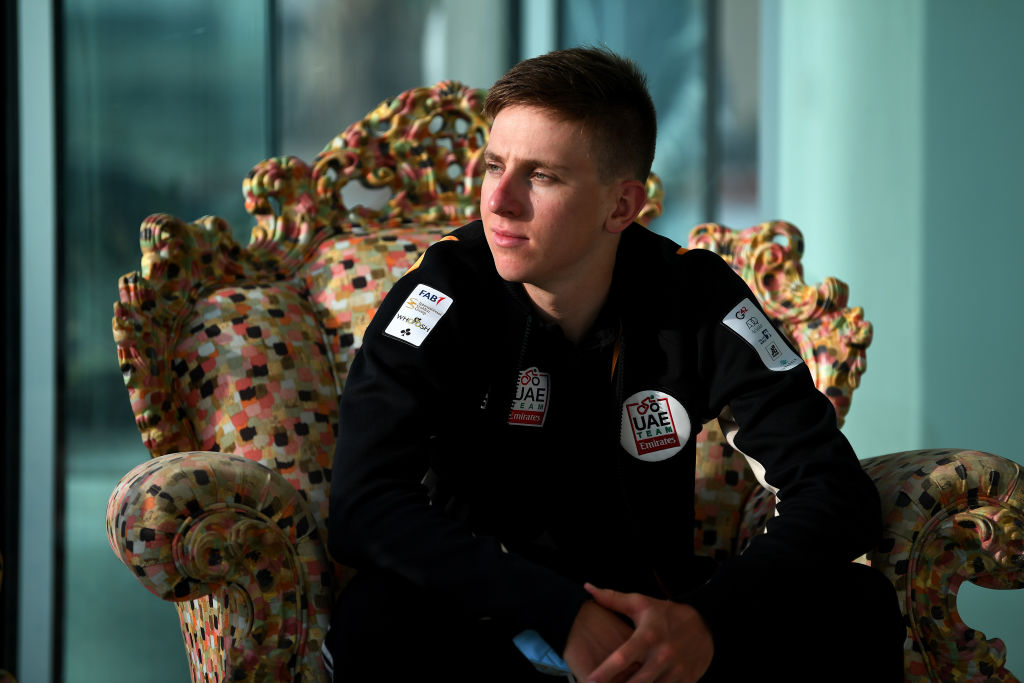
Pogačar now lives in Monaco with his fiancée and fellow professional Urška Žigart, in the same building as teammates Davide Formolo and Valerio Conti. He often trains with Michael Matthews and Jasper Philipsen but likes a quiet life, choosing to live in a small apartment.
"It’s a comfortable place, if I have a bigger place, who would clean it?" he joked to La Gazzetta dello Sport.
"The only reason we might move is to make it easier to put our bikes in the garage. Money is important to buy certain things and can make life easier but it doesn't motivate me.
"When I was young I didn’t think about making history or about important results. I just wanted to ride with my friends, go full gas on the climbs and sprint against each other. If I have a secret, it’s that I still live that way even now."
Pogačar admits he not perfect. He does occasionally get angry, including in races, but tries to keep his anger under control.
"I try to hold it back and not show it," he says.
"Sometimes you wake up in a bad mood and it’s easy to throw yourself off line and say stupid stuff. But I really try not to do that and I really try to understand other people around me.
"In races, it’s really important you don’t go crazy, stay focused and do what you need to do. If you have a puncture or crash, you can get mad but there’s nothing you can do in that moment. You fix it as quickly as possible and race on. Getting angry is never the fastest way to get over a problem."
The success and lessons of 2021
Tadej Pogačar raced for 60 days in 2021, clocking up close to 30,000km in the saddle when adding in all his training. He won races from the UAE Tour in February right up to the recent Il Lombardia, and dominated his second Tour de France to seal back-to-back titles at the age of 22.
With victory at Il Lombardia, and at Liège-Bastogne-Liège earlier in the year, he became only the third rider in history, after Merckx and Fausto Coppi, to win the Tour de France and two Monument classics in the same season.
"It was a long season but I enjoyed it all," Pogačar tells Cyclingnews, his happiness clearly visible despite a sense of end-of-season fatigue.
"After the Tour de France, you kind of drag your form around for the rest of the season. It’s tough but if you enjoy the races like I do, then you can do it."
Pogačar's two Tour de France victories were very different, even if he did win three stages on each occasion. In 2020, he snatched the title from compatriot Primož Roglič in that incredible penultimate-day time trial to La Planches des Belles Filles, whereas this year he dominated the race, wearing the yellow jersey for 14 days.
"It’s hard to put one above the other. They were both hard to win, like every race," he suggests modestly.
"Last year was my first Tour and I won it on the second-last day. Last year I was really firing right to the end and trying to take the seconds I needed to win. It was a surprise and then all of a sudden I was in the yellow jersey.
"This year was totally different. I was in yellow for two weeks and so won by defending it with the team. It was pretty amazing to race every day in yellow. It was pretty different to earning it on the last day, even if the emotions are the same."
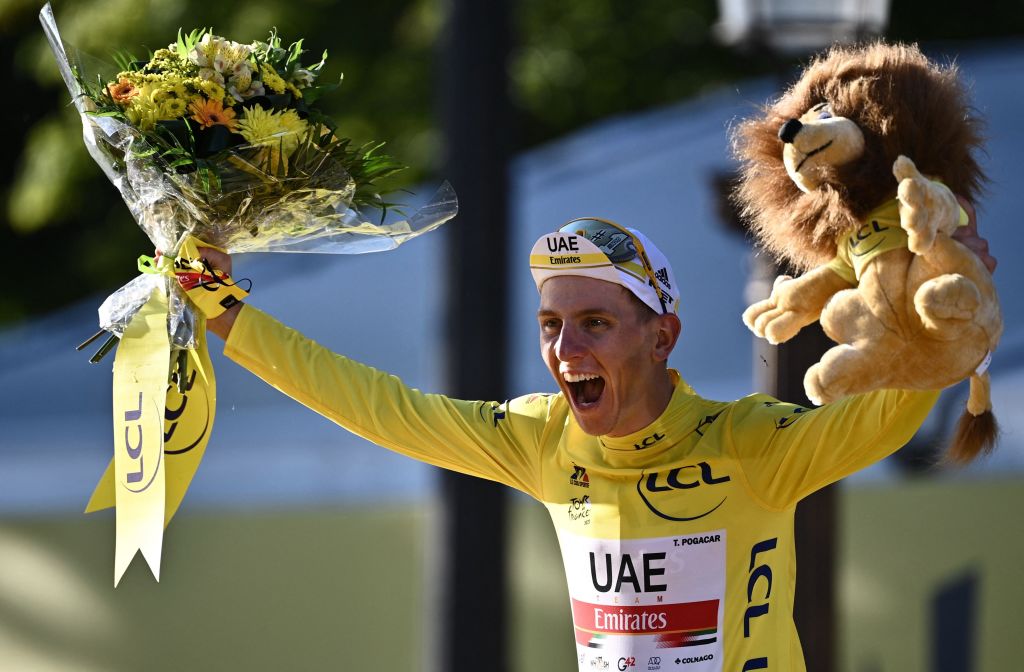
Pogačar constructed his 2021 Tour win by avoiding the early crashes that eventually took out Roglič, Geraint Thomas, and others. He won the time trial in Laval on stage 5 and then imposed his authority on the first mountain stage to Le Grand Bornand with a long-range solo attack on the Col de Romme, extending his lead on his biggest rivals to five minutes.
"I’ll never forget that stage. It was my best performance ever and I was super happy with it," he says.
"Of course, the other days were important too, when the team did the work to not mess up the GC. That’s why I can’t forget the work they did. They were the best thing that happened in the Tour and why we celebrated as a team in Paris."
Pogačar’s performance was considered extraterrestrial by some data and power analysts, who calculated his numbers were as good as - if not better than - those of Lance Armstrong.
Pogačar, perhaps misguidedly, used Armstrong’s classic retort when asked about doping suspicions during the Tour de France, suggesting the amount of anti-doping controls proves his doubters wrong. He was defended by the UAE Team Emirates Head of Medicine Jeroen Swart, who told Cyclingnews at the time: "It’s trying to prove a negative and that’s not possible."
Learning to live with the suspicions and learning how to answer questions about his performances was perhaps a key part of Pogačar’s development as a Tour de France winner in 2021. Due to the history of doping in professional cycling, especially the Tour de France, Pogačar’s performances are understandably scrutinised as much as they are admired.
He now understands that but says the accusations also hurt.
"It does hurt but I should have expected it because of all the history in the sport. I know that people can’t trust us that easily," he tells Cyclingnews.
"It hurts because of what we do. We train so much, we put a lot of things aside in our lives to be at the top level and make a lot of sacrifices, so suspicions hurt."
Leading a new generation and a new way of racing
At just 23, Pogačar is leading a generation of young riders who are ignoring the traditional hierarchy of the sport. Mathieu van der Poel, Tom Pidcock, Wout van Aert and Remco Evenepoel are doing the same in their own way and their own preferred races. They are not afraid to attack early in races and to rip up the traditional pro cycling copy book of waiting for the finale.
This year, Pogačar raced aggressively to win Liège-Bastogne-Liège, bossed the Tour de France, and was not afraid to attack solo with 35km to go at Il Lombardia, just a few days after attacking from 120km out at Tre Valli Varesine.
The impact of the COVID-19 pandemic has been given as one reason, while others suggest young riders now train as scientifically as their elders, if not better. Either way, Pogačar perfectly embodies that talented, youthful impatience.
"Apparently the [attacking] gene skipped a few generations," he joked to L’Equipe.
"This year, more than ever, the races were really open, the leaders attacked from afar. It's great, isn't it? When you sit down on your sofa and turn on the TV, that's what you want to see: guys who start attacking 100 kilometres from the finish - not wait-and-see riders who wait for the last 10 kilometers to go into action.
"I feel like professional cycling has never been so fun and that's to be celebrated."
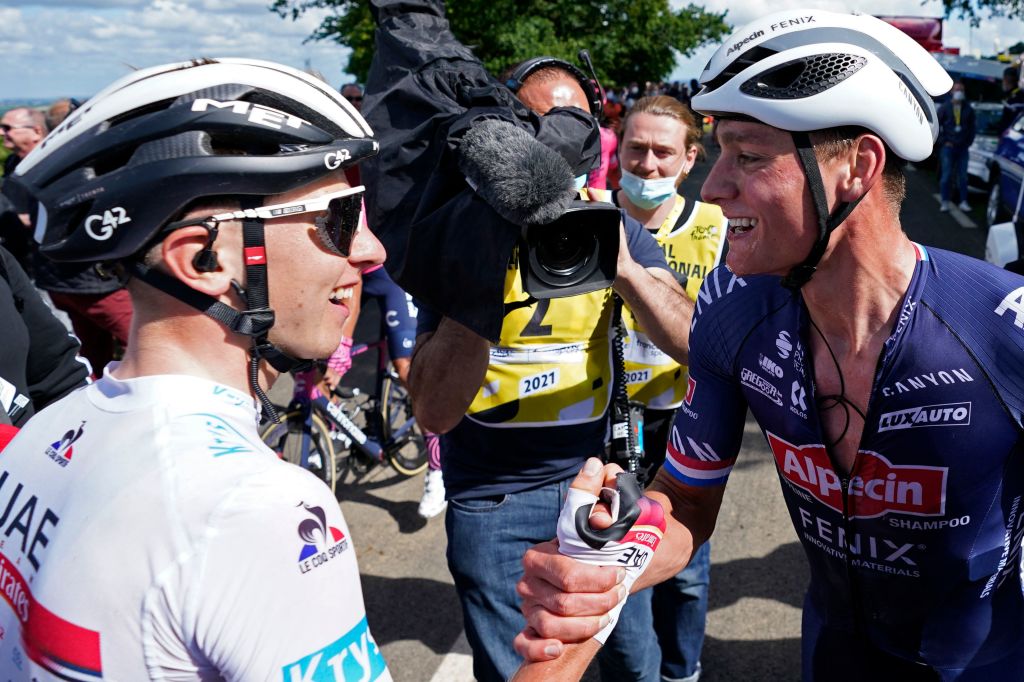
Pogačar’s explanation for the aggressive racing and high speeds is simple.
"We're going faster today than 10 years ago, that's undeniable," he said.
"The training methods have evolved, the equipment too. The bikes are lighter, more aerodynamic and easier to ride, even at more than 70 km/h. It’s pretty clear that young riders benefit the most from these technological improvements."
Targeting the Tour de France again and cheering on Žigart in 2022
This week Pogačar will travel to the UAE to celebrate the success of 2021 with his teammates and sponsors. Before finally enjoying a holiday, he will also begin to plan for 2022.
Ever keen to please, Pogačar has talked to La Gazzetta dello Sport about one day riding the Giro d’Italia and is always proud to ride for Slovenia at the World Championships. However, the Tour de France will again be his major goal of 2022.
His enthusiasm for the race route was palpable at the presentation last week in Paris. He should be able to handle the stress and difficulties of the opening stages in Denmark and the cobbles of northern France before using his climbing ability in the Alps and Pyrenees and then his time trialing skills on the 40km penultimate stage.
Pogačar’s Tour de France will probably last four weeks, his own three-week race followed by another week on the road following Žigart in the Tour de France Femmes.
"When I finish my Tour, I’ll probably be going in a camper to see the women's Tour," he said in Paris. "It's a historic moment for cycling, it's going to be a great event."
Pogačar cheered on Žigart at the Trofeo Binda when he had a free weekend in late March and also excitedly watched her win her first race on his phone in May. The pair train at home together in Monaco when possible and even spent time together at a pre-Tour training camp.
UAE Team Emirates will take over the Alè BTC Ljubljana team for 2022, adding a women’s WorldTour team alongside the men’s programme.
"Urška is happy at BikeExchange but I’m super happy UAE Team Emirates has a women's team. It’s a big step up and it's cool because women’s cycling is really cool," Pogačar says, a clear supporter of women’s cycling.
"I’m happy to do what I can to help women’s racing. The men have a lot of the television coverage, big salaries and bigger prize money but women’s cycling doesn’t have that yet.
"Urška comes to my races a lot, so I’m happy to go to her races too. You might even see me hanging up some bidons at next year’s Tour de France Femmes."
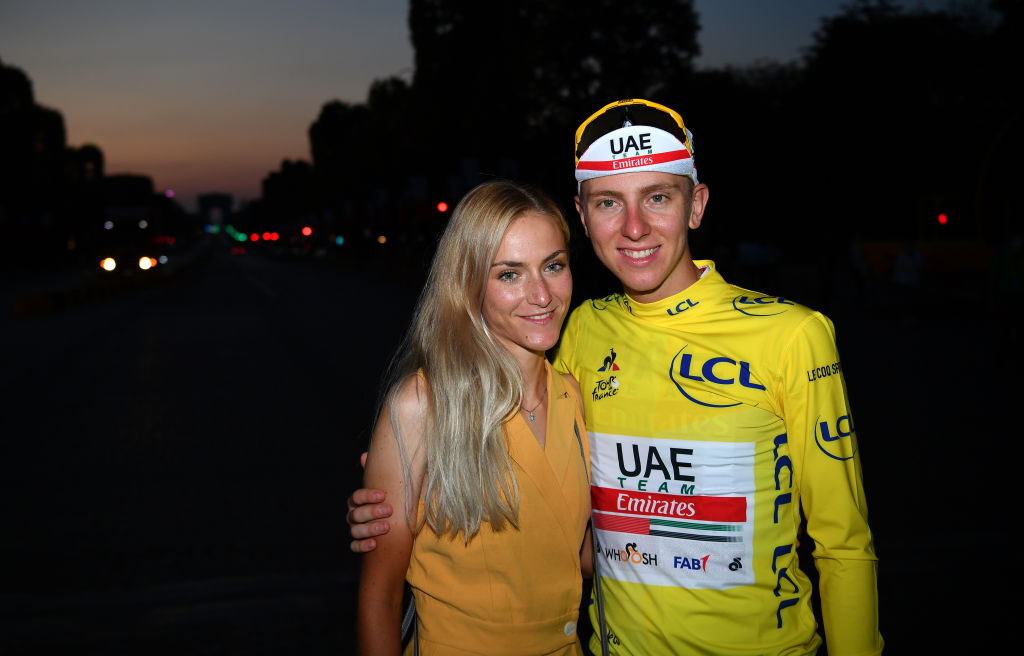
Pogacar may chase a Giro-Vuelta double or even risk a Giro-Tour challenge in the years ahead because he is not interested in chasing the record of five Tour de France victories. However, his 2022 season will be built around the Tour.
"It’s almost certain I’ll go back to the Tour and go for the win but I don’t really feel the pressure to win again," he tells Cyclingnews.
In 2022, Pogačar can count on an even stronger UAE Team Emirates squad, with George Bennett, Pascal Ackerman and Marc Soler joining Brandon McNulty, Rafa Majka, Marc Hirschi, Davide Formolo and Mikkel Bjerg as key riders and the core of the Tour de France team.
João Almeida is another new signing and will likely target the Giro d’Italia and share team leadership and expectations with Pogacar in 2022, who extended his own contract after this year’s Tour to earn a reported six million Euro until 2027.
"We’re growing and improving every year and I love to see that the team is becoming one of the best in the world," Pogačar says.
"UAE Team Emirates hasn’t been going that long compared to other big teams, so I think there’s a lot of stuff we can learn and improve on. I’m excited that we’ve got super good riders coming on board for 2022.
"We’re on the right path, we’ve won the Tour de France twice, it show’s what we’re capable of and I think we’re near to being one of the best. The 2021 season is only just over but I’m already excited about what 2022 will bring."

Stephen is one of the most experienced member of the Cyclingnews team, having reported on professional cycling since 1994. He has been Head of News at Cyclingnews since 2022, before which he held the position of European editor since 2012 and previously worked for Reuters, Shift Active Media, and CyclingWeekly, among other publications.